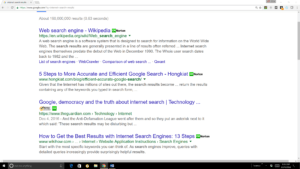Keep Search Results in Mind when Writing Content
How to improve the search results of your internet content. Many of my clients and business friends have high-quality website content that is seldom found. It takes considerable experience, education, and hard work to produce this valuable content. A little additional planning for search engine optimization will improve the chance of this work being read and perhaps generate interest and sales leads for their businesses. Focus your writing on improved search results.
First – What is your business goal for writing (content)?
- Establish authority?
- Prove expertise?
- Generate leads?
- Provide free information?
Unless your business is not for profit, I doubt you are expending resources to provide free information without the goal of one of the first three items. The real reason is the third, to generate sales leads. Every business needs sales leads to survive.
To accomplish the third goal online, the content needs to be optimized for search by the major search engines. Your content will not be found just because it is well written or contains valuable information. There are over 81 million websites in the USA. Multiply the websites by pages and articles on each website. This equates to considerable competition for your content to be viewed by anyone, especially a potential customer.
Fortunately for you, not many businesses focus on search engine optimization and don’t optimize individual articles and posts. This fault improves your chances of coming out on top. Optimizing your content for the web also optimizes it for the reader in any medium.
Second – Make the Content Searchable.
Improve the article’s chance of appearing on the first results page of Google, Bing, or Yahoo searches. Referred to as (SERP) or search engine results page. Even if the search results return 4 million results, most consumers will not look past the first page of 10 results. If your content doesn’t appear on that first page, no one will visit the website to read the content.
Quality and authoritative content are very important for search engines to find your article. Ensuring that the search engines find your article or web page is the first step in the evaluation of the quality of your article. If the search engines don’t find your content, they won’t evaluate it or rank it on the results page.
Third – Start with a few simple steps to improve Search Results.
Here are a few simple steps when composing the article or blog:
- First, the term or phrase that might be searched.
- What is the theme, topic, or idea?
- Who are you trying to reach?
- Where do they hang out on the web?
- How will the reader benefit from reading this material?
- What words or terms will the reader use when searching for information?
- How will they phrase the question for the search word or term?
- Try searching on Google and Bing for your keywords.
- What types of websites came up on the first page of results?
- Is it what you expected?
- Are they competitors?
- What suggestions did Google make for search terms?
- Check the bottom of the first page of Google for more suggestions.
- Try other similar terms and combinations.
- Review the competition.
- What is the description of the page in the results?
- What words are highlighted in bold type?
- Is the description exciting and compelling to click on it?
Repeat this process until you understand the potential interest of consumers searching for information. If you find no interest, change your topic. Some more methods and tools will allow a writer to research further into keywords and the competition for those words. These first steps will be enough to start improving the results and value of writing your content for search results.
Writing the Content for Search.
Start with the title.
The title of this blog is “Improve Internet Search Results.”
The keywords in the title are Improving, Internet Search, and results. I purposely didn’t use SEO because it is an acronym used by people with knowledge of digital marketing, not business owners. Business owners or writers might be more inclined to use internet search results as a search term. I also used the Google Trends screenshot shown below to ensure there was some search volume for this term and the geographic origins of the searches.
Note the length of the title. The target is less than 50 characters. You want the title to show entirely in search results. More than 50-55 characters will be cut off on the result listing.
The Description of Article Helps Search Results.
Each search result displays a description of the article for the searcher. This description is critical to encourage the viewer to “click” on the description or results to visit your web page or article. It needs to be a compelling description. You need to control this message. If you don’t control it, the search engine picks up the first 150 characters of the first paragraph in the article and displays that. If you are good at introducing your subject in the first 150 characters of the first sentence, you might be ok. It is better if you supply a description as the meta description on the web page to control what appears on the search result page.
Review the search result descriptions below. None of them are optimized. These descriptions have been taken from the first paragraph of the article. Several picked updates. No one will click on an article from 2010. Control your destiny by writing your own meta description for your webmaster or the person posting the information. If you can’t control your meta description, write the first 150 characters of the article to get the reader’s attention. That first 150 characters is what the search engines will display if you don’t specify the meta description.
The Rest of the Search Results Story.
Now you have your title and description containing the keywords you selected for the article. When writing the article, keep these words in mind or derivations of the words. Google’s algorithm for keyword scanning articles picks up semantic variations or related words in the content. Do not try to stuff the keywords into the content. The content needs to flow naturally and be easy to read. Try for 3-4% of the content containing the keywords.
Keep paragraphs short. Sections of each key idea are no more than 300 words. Identify each section or idea with a heading. Use Heading tags. Your webmaster knows what this is or if you are using software for publishing, it should let you identify the headings as H1, H2, H3, etc. Most publishing software will automatically make the title H1. Don’t use more than one H1 tag or H2 tag. It is ok to have multiple H3 or H4 etc.
The key is to keep the content in each heading short and to the point. You want the Google algorithm and the reader to absorb these tiny bits of information quickly. Most readers will not immediately begin reading your content as if they are reading a novel. They are looking for specific points that are of interest to them. Make it easy for them to find these points.
Wrap-Up Writing for Search.
Ensure you wrap up the content with a summary and a call to action. Do not put a contact form on each page. Google doesn’t like too many contact forms. Better to have a link to For More Information that takes the reader to a single contact form on the website. Your webmaster can hypertext the author of the article’s name. Be sure to reference copyright or all rights reserved.
Use links to references for the article or other articles and pages on your website if appropriate. Find a suitable photo or graphic that illustrates your point. Ensure your webmaster properly identifies this photo with an Alt Text descriptor containing the keyword.
There are a lot of great resources on the web for search engine optimization. I use SEMrush, Moz, software, and Yoast, Squirrly WordPress plugins to assist my research and writing. Feel free to comment or ask questions below. If you are serious about getting it right for your business, feel free to contact me for a no-obligation discussion of your goals and challenges.
Not an expert writer
I’m an expert technical writer, but I strive to optimize my blogs and encourage my clients to optimize their work. There are numerous resources for writing content if you are not a good writer and don’t have one on staff. The challenge is finding a writer that knows enough about your business sector to translate the business language into readable content. One search result lists the top writing techniques for good readable content.
Search results and ranking in the search are essential. It is one way to help ensure people can find your online store.
Contact us if you need help.
Copyright 2018 Wescat, Inc.


